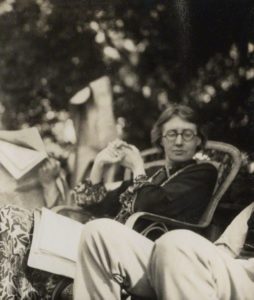I was very surprised to hear the voice of Virginia Woolf. I was alerted to it by a writing friend. Apparently it was the only recording of her voice. What surprised me was not that she belonged to the part of English society that will call a ‘house’ a ‘hice’, more that she had those firmly embedded upper class pretensions, ideas, expectations of life, and yet at the same time was deadly peculiar in her thoughts about sex and men and women and herself. And, that she was considered a slippery individual in her own group of Blooming friends. Even in the recording, I noticed she referred to ‘mating’ by which she meant copulation in its most horrid sense, I suspect.
Oh dear, I haven’t yet been able to warm to this writer. I’ve reached the point in James King’s biography in the years 1921 to 23, and what interested me there was the following in which Virginia is considering herself as a writer:- ‘She had to face the fact that she might never become a popular author – her own lot might be an unpleasant mixture of disregard and abuse. So, she decided, she would write what she wanted and take the consequences: ‘‘My only interest as a writer lies, I begin to see, in some queer individuality: not in strength, or passion, or anything startling; but then I say to myself, is not ‘some queer individuality’ precisely the quality I respect?’’ On such terms she could go on…. ‘Some ‘queer individuality’ in story-telling had once been a bond shared with Katherine Mansfield.’
But when Katherine’s collection, ‘The Garden Party’ came out she was spiteful about it. She said: ‘My theory is that while she possessed the most amazing senses of her generation so that she could actually reproduce this room for instance, with its fly, clock, dog, tortoise if need be, to the life, she was as weak as water, as insipid, and a great deal more commonplace, when she had to use her mind. That is, she can’t put thoughts, or feelings, or subtleties of any kind into her characters, without at once becoming, where she’s serious, hard, and where she’s sympathetic, sentimental.’




